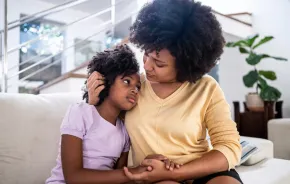
Editor's note: ParentMap publishes articles, op-eds and essays by people of all experiences and from all walks of life. The opinions expressed in their articles are their own and are not endorsed by ParentMap.
I was in my late 30s when I realized I was an autistic mom of three. My then 2-year-old daughter and I were diagnosed with autism spectrum disorder (ASD) on the same day. I spent hundreds of hours doing medical research to figure out what was ailing her; I knew the doctors were wrong when they said she had just a language delay. Eventually, I came to the conclusion that not only was she autistic — I was, too.
I had to fight for our diagnoses because girls and women are often overlooked for an ASD diagnosis, which is typically thought of as a male disorder. According to the Centers for Disease Control and Prevention, only one girl is diagnosed with ASD for every 4.5 boys. I was lucky to find a clinical psychologist familiar with the gender differences with autism to secure both of our diagnoses. One year later, my 2-year-old son was diagnosed too. (My oldest daughter doesn't have an ASD diagnosis.)
Getting myself and my kids diagnosed was life changing, but not earth shattering. I had spent my whole life struggling to hide my autism, although I didn’t know that's what I was doing at the time. Knowing that my kids and I are autistic means that we can get the support we need.
But being autistic isn't just a medical diagnosis for me: It’s an integral part of my identity. Even though I couldn’t put a name to it, I always knew growing up that I was different. The way I experience the world is through an autistic lens. I don’t know what it’s like not to be autistic.
The way I experience the world is through an autistic lens.
I can confidently say that I have accomplished a lot because I’m autistic, not in spite of it. I have my doctorate in English because literature is one of my special interests or areas of intense focus. My memories are stored like videos with rich sensory details, which help me write vivid scenes as an autistic writer. Having first-hand knowledge of what it’s like to be autistic makes me a better mom for my autistic kids.
But I also think of myself as a mom with autism. This is the person-first language that medical professionals often use because ASD is after all a medical diagnosis. I would be lying if I didn’t admit the day-to-day struggles I go through and watch my kids go through. When I’m in the middle of an autistic meltdown — an uncontrollable crying fit that makes me feel like my head is going to explode — I think of myself as a mom with autism. I can only imagine what it must feel like for my kids.
I would be lying if I didn’t admit the day-to-day struggles I go through and watch my kids go through.
As a writer, I’ve found that some editors revise my work so that person-first language is used to refer to me and my kids, while others keep the identity-first language that I write in my essays. For Glamour, I wrote my own titles: “I’m an Autistic Woman, and This is How I Navigate the Workplace” and “I’m an Autistic Woman, and Bones is the Only Character Like Me on TV.” I also had some input on the title for my essay in the Washington Post: “My Daughter and I Are Autistic. Here’s How We’ve Bonded Through Ballet.” But I didn’t write the title for my essay in the New York Times, “What a Muppet With Autism Means to My Family,” where person-first language is used even for Julia, the Sesame Street Muppet.
When I chose my Twitter handle @momwithautism (simply because @autisticmom was already taken), some other autistic people publicly shamed me on Twitter for using this handle and even blocked me from following them. They felt that by using person-first language to describe my autism, I was being disrespectful to all autistic people. Another autistic woman defended me on Twitter, saying that I had a right to choose the language I used to describe my own autism. My response was simply not to respond, other than liking the post that came to my defense. I don’t engage with bullies.
I choose to call myself both an autistic mom and a mom with autism. When my kids are old enough to understand the language around autism, I will ask them what they prefer. For now, I refer to them as my autistic kids to acknowledge that autism is part of their identities.











